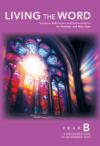Scripture Study for
Easter Sunday of The Resurrection of The Lord
Acts 10:34a, 37–43 / Psalm 118:24 / Colossians 3:1–4 or 1 Corinthians 5:6b–8 / John 20:1–9
<< Back to LECTIONARY RESOURCES
Understanding the Word
By Br. John R. Barker, OFM
In the coastal town of Caesarea lived a Roman named Cornelius who was “devout and God-fearing.” He had received a vision from God, instructing him to summon Peter, who, for his part, has been instructed by God to go (10:1–33). His speech is the kerygma in a nutshell: Jesus was anointed by God to go about “doing good and healing.” Nevertheless, he was condemned to death. Yet God raised him from the dead, after which he appeared to witnesses who could testify with certainty that his resurrection was real. Peter affirms that Jesus’ mission is being extended through himself and others, who are preaching in order to bring God’s forgiveness of sins to everyone— Jew or Gentile—who believes (trusts) in Jesus.
Colossians reminds the baptized that, like Christ, they have died to earthly things, those aspects of the world that are opposed to Christ. Now “raised,” believers actually live “above” with Christ, and must act accordingly. When Christ appears again, this new life, now “hidden” (accessible only by faith), will be revealed in all its glory. Paul’s exhortation to the Corinthians has a simple point: you are now new people in Christ, so act like it. In preparation for Passover, all yeast and leavened bread is cleared out of the house; after the feast new leavened bread is prepared. The Corinthians have failed to do the necessary “house cleaning” both in their own hearts and within their community and are therefore not properly celebrating the Paschal feast, begun with the sacrifice of the Paschal Lamb.
When Mary Magdalene sees the empty tomb, she thinks at first that perhaps Jesus’ body has been stolen. The Evangelist spends some time, however, describing the empty linens, something thieves would not take the time to leave behind. We remember that when Lazarus (who would die again) was raised, he came forward in his linens. Jesus, who will not die again, has left the linens, like death itself, behind. When the Beloved Disciple sees the empty tomb and the linens, he believes that Jesus has been raised from the dead, not stolen, but he does not yet fully comprehend the meaning of the Resurrection. Understanding only comes when one encounters the resurrected Lord.
